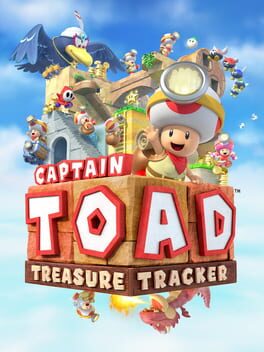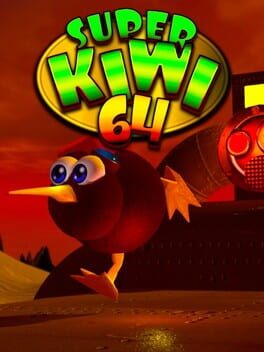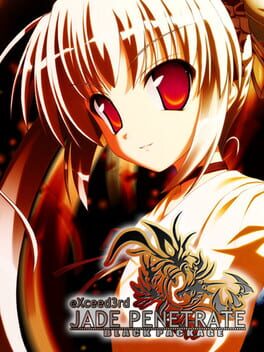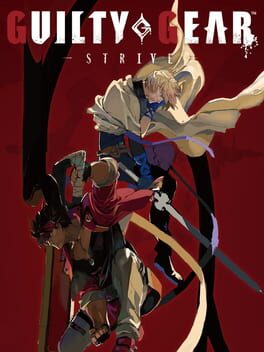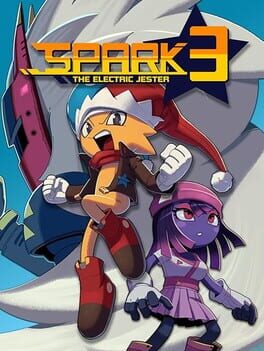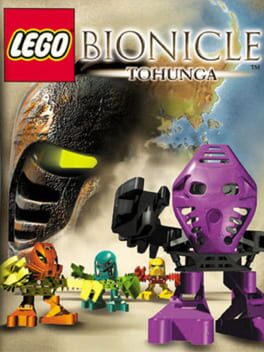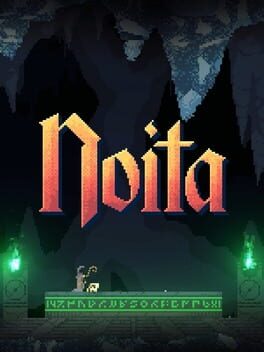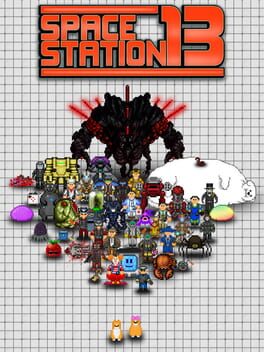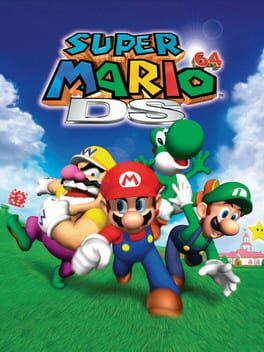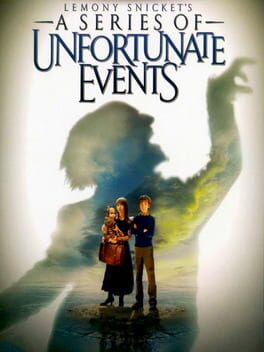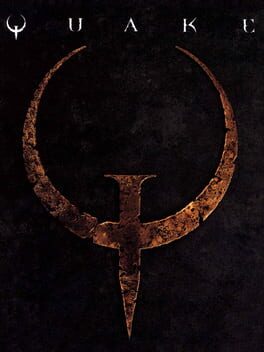SpineReader
27 Reviews liked by SpineReader
Super Kiwi 64
2022
Super Kiwi 64
2022
Guilty Gear: Strive
2021
90% of what I would way about this game I already said in my review of the second one. In some ways I prefer how concise the previous game is, but this is just plain unreal. It's more polished, encourages more varied styles of platform gameplay, has a more coherent story that's genuinely gripping by the end. I could nitpick about minor gripes I have with small changes made from the previous one, the same way I could with a 3D Mario game, but at the end of the day 3D Spark has some of the best 3D platforming mechanics that exist, and this is more of it.
I'm usually pretty cynical but a few games this year have made me feel ways that games haven't made me feel in quite a while. A very exciting time. You absolutely cannot miss this.
I'm usually pretty cynical but a few games this year have made me feel ways that games haven't made me feel in quite a while. A very exciting time. You absolutely cannot miss this.
It's easy, sometimes, to forget that FromSoft is at this point a triple-A studio. The games in their Souls quasi-series are so idiosyncratic, and remain so true to the personality of Demon's Souls and Dark Souls, that even as budgets would bloom in size they still kept much of that original slightly-janky charm. Even Elden Ring, a game whose colossal size makes its budget clear, and that unfortunately teeters into open world design industry standard bloat, still flies in the face of a lot of other industry standard design philosophies in such an intense way that other triple-A developers were up in arms upon the game's release at the notion that people were actually enjoying it so much.
Then, there's Sekiro. Don't get me wrong here, Sekiro is still undeniably a FromSoft game; obtuse, thematically deep and unusually challenging. That said a bit of me wonders how much influence Activision might have had on this game's final form, with the mass of skill trees and weapon unlock trees, something that makes my eyes glaze over at the very sight of, feeling both wholly extraneous to the experience the game is trying to provide and reminding me of the way that trash like God of War slaps on rpg systems into a decidedly not-rpg game just because that's the industry standard. There are hints of this design philosophy elsewhere with quick-time events, platforming based more around hunting for symbols to click on rather than thoughtfulness, even the bizarre inclusion of a boss rush mode, and whilst none of this was as objectionable to me as the tacked-on rpg aspects it still all hints at a design approach that is very much at odds with FromSoft's other output and which lands as off-putting to me. Even the game's insistence on having picking up an item cause in turn a pop-up, listing in entirety what an item does even if you've picked up said item ten times beforehand, to take over the screen and interrupt the gameplay feels like it may have come from an Activision higher-up tapping on Miyazaki's back to say that expecting people to go into their inventory to read what the items do there is a step too far.
At the same time there's an assured artfulness to Sekiro that excels beyond their other work, too. I adore the thematic exploration of this company's work just generally, and in particular I am very drawn to the almost tone poem nature of the Dark Souls trilogy, but Sekiro manages to use more exact language to tell such a wonderful and engaging tale about devotion and commitment, corruption and the nature of family. This aspect of the game is something I was not able to fully appreciate at the time for reasons I will get into shortly, but re-watching some of these cutscenes now and taking a more vested interest in the lore in the past day or so has revealed a real, subtle and powerful emotionality to the game, and I do find aspects of Sekiro quite beautiful as a result of this.
The biggest diversion from the Souls games is of course Sekiro's combat system, built around deflection, parries, posture, and the notion that you must not hesitate, must be prepared to be relentless. At its very peak this leads to some of the best fights FromSoft has ever presented; one-on-one fights with other warriors-with-swords like Owl, Genichiro and the final boss, or even mini-bosses like the Lone Shadows, O'Rin and the Ashina Elites, present such intense battles, that mechanically encourage you to never let up and that carry this almost rhythmic joy to them once, after many iterations, you start to truly understand the timings of those deflections and how to respond to your opponent's actions. Genuinely thrilling, adrenaline surging stuff, and immensely rewarding to gain a handle on after the steep learning process.
Conversely, when Sekiro's fights deviate from this structure I found the combat honestly lacking. Demon of Hatred might well rank below Bed of Chaos as my least favourite FromSoft boss ever, and fights like the Guardian Ape encounters, Headless Ones, Chained Ogres, Shichimen Warriors and the Bulls all attempt to mix things up, to encourage you to engage with the full extent of what Sekiro's combat system is capable of, but I find many of these fights frustrating in how they don't feel like they actually play to Sekiro's strengths, and tedious in some of the play-patterns they can encourage. This is emphasised by the game's difficulty; for me Sekiro was the hardest game this company has released by a substantial margin in part because the Souls games allow a lot more means for you to influence their difficulty, but mostly because the Souls games largely ask for your patience, for you to be willing to learn and meet the game on its own terms, whereas Sekiro asks, undeniably, for impressive reflexes and dexterity. I found myself mostly able to meet the game on these terms, and I legitimately enjoyed a large part of the process involved in learning to beat some of the more imposing bosses here, but the moment Sekiro deviates from its strengths and asks you to beat up some rampaging ape, whilst still keeping the difficulty high for these ill-fitting encounters, it starts to really lose me and leave me, for the first time since Dark Souls 2, genuinely frustrated (and honestly; baffled).
There are some other issues I have with the game also; a small handful of mini-bosses necessitate the usage of consumables that are very limited in quantity until late into the game, the scaling up in difficulty of areas reaches the point that by Fountainhead Palace I was finding some of the encounter design quite unpleasant especially when the game asks that you fight multiple enemies at once that are fundamentally designed to be fought one-on-one with deflects and parries (all too often my response to this was just to run past them, which is equally unsatisfying), the game is just frankly over-long which makes its insistence on recycling large amounts of content feel even more bothersome.
There are points where I look back on Sekiro and feel like I could rate the game even as much as a full star lower and not have that much regret, yet at the same time it feels undeniable that some of FromSoft's very best work exists within here also and the moments when it shines it is glorious. I wish I liked this game more than I do.
Then, there's Sekiro. Don't get me wrong here, Sekiro is still undeniably a FromSoft game; obtuse, thematically deep and unusually challenging. That said a bit of me wonders how much influence Activision might have had on this game's final form, with the mass of skill trees and weapon unlock trees, something that makes my eyes glaze over at the very sight of, feeling both wholly extraneous to the experience the game is trying to provide and reminding me of the way that trash like God of War slaps on rpg systems into a decidedly not-rpg game just because that's the industry standard. There are hints of this design philosophy elsewhere with quick-time events, platforming based more around hunting for symbols to click on rather than thoughtfulness, even the bizarre inclusion of a boss rush mode, and whilst none of this was as objectionable to me as the tacked-on rpg aspects it still all hints at a design approach that is very much at odds with FromSoft's other output and which lands as off-putting to me. Even the game's insistence on having picking up an item cause in turn a pop-up, listing in entirety what an item does even if you've picked up said item ten times beforehand, to take over the screen and interrupt the gameplay feels like it may have come from an Activision higher-up tapping on Miyazaki's back to say that expecting people to go into their inventory to read what the items do there is a step too far.
At the same time there's an assured artfulness to Sekiro that excels beyond their other work, too. I adore the thematic exploration of this company's work just generally, and in particular I am very drawn to the almost tone poem nature of the Dark Souls trilogy, but Sekiro manages to use more exact language to tell such a wonderful and engaging tale about devotion and commitment, corruption and the nature of family. This aspect of the game is something I was not able to fully appreciate at the time for reasons I will get into shortly, but re-watching some of these cutscenes now and taking a more vested interest in the lore in the past day or so has revealed a real, subtle and powerful emotionality to the game, and I do find aspects of Sekiro quite beautiful as a result of this.
The biggest diversion from the Souls games is of course Sekiro's combat system, built around deflection, parries, posture, and the notion that you must not hesitate, must be prepared to be relentless. At its very peak this leads to some of the best fights FromSoft has ever presented; one-on-one fights with other warriors-with-swords like Owl, Genichiro and the final boss, or even mini-bosses like the Lone Shadows, O'Rin and the Ashina Elites, present such intense battles, that mechanically encourage you to never let up and that carry this almost rhythmic joy to them once, after many iterations, you start to truly understand the timings of those deflections and how to respond to your opponent's actions. Genuinely thrilling, adrenaline surging stuff, and immensely rewarding to gain a handle on after the steep learning process.
Conversely, when Sekiro's fights deviate from this structure I found the combat honestly lacking. Demon of Hatred might well rank below Bed of Chaos as my least favourite FromSoft boss ever, and fights like the Guardian Ape encounters, Headless Ones, Chained Ogres, Shichimen Warriors and the Bulls all attempt to mix things up, to encourage you to engage with the full extent of what Sekiro's combat system is capable of, but I find many of these fights frustrating in how they don't feel like they actually play to Sekiro's strengths, and tedious in some of the play-patterns they can encourage. This is emphasised by the game's difficulty; for me Sekiro was the hardest game this company has released by a substantial margin in part because the Souls games allow a lot more means for you to influence their difficulty, but mostly because the Souls games largely ask for your patience, for you to be willing to learn and meet the game on its own terms, whereas Sekiro asks, undeniably, for impressive reflexes and dexterity. I found myself mostly able to meet the game on these terms, and I legitimately enjoyed a large part of the process involved in learning to beat some of the more imposing bosses here, but the moment Sekiro deviates from its strengths and asks you to beat up some rampaging ape, whilst still keeping the difficulty high for these ill-fitting encounters, it starts to really lose me and leave me, for the first time since Dark Souls 2, genuinely frustrated (and honestly; baffled).
There are some other issues I have with the game also; a small handful of mini-bosses necessitate the usage of consumables that are very limited in quantity until late into the game, the scaling up in difficulty of areas reaches the point that by Fountainhead Palace I was finding some of the encounter design quite unpleasant especially when the game asks that you fight multiple enemies at once that are fundamentally designed to be fought one-on-one with deflects and parries (all too often my response to this was just to run past them, which is equally unsatisfying), the game is just frankly over-long which makes its insistence on recycling large amounts of content feel even more bothersome.
There are points where I look back on Sekiro and feel like I could rate the game even as much as a full star lower and not have that much regret, yet at the same time it feels undeniable that some of FromSoft's very best work exists within here also and the moments when it shines it is glorious. I wish I liked this game more than I do.
Noita
2020
Space Station 13
2003
Super Mario 64 DS
2004
Super Mario 64
1996
What does it mean to "play" a video game?
Do we play a role within the game, as an actor? Do we play it as we do a movie, and experience it as an audience? Do we play a sport on the screen, as a competitor? Depending on the game, depending on individual taste, any number of answers ring more true than the next, but I know what is most valuable to me.
The best video games are "played" in the same way that one "plays" a song.
Super Mario 64 is the first video game I played as a kid, and if it is not still my favorite game today, it is the scale by which my favorite game will be judged.
A video game controller, like a musical instrument, is on its own little more than a strange contraption with no visually apparent practical use (perhaps especially for the Nintendo 64 controller). It is only through use of the object, following a set of instructions, that the beauty of the thing becomes clear. A video game, like a song, must be learned.
Only three notes make up the swirling improvised harmonies of Super Mario 64's composition; three buttons, the function of which could be summarily described by the verbs "Ascend", "Descend", and "Lunge". Following a burst of upward momentum the player could effortlessly transfer this kinetic energy into a forward dive. One action leads into another seamlessly; Super Mario 64 is a platformer with the combo variety and tight precision of a character action game.
Super Mario 64 transforms the controller into rhythmic percussion. A flick of the stick, the thumb tapdancing atop the A and B buttons. Mario shouts with delight as coins jingle and his enemies grunt and squeal. Like a free jazz, it is hectic, it is also under control.
And like free jazz, it is endlessly improvisational. From every instant that the player decides their movement, to the traversal of the stage, to the gradual uncovering of the castle's many paths, the player is constantly making choices on every possible level. The game only requires any combination of little more than half of its objectives to be cleared in order to see the end; what any individual has difficulty with can be passed over, and onto the next.
The levels both possess within themselves an apparent Dark Souls-ian spiral of interweaving paths, and contain unseen swooping one man rollercoasters which the player is left to carve for themselves. Many objectives simply exist as an object in the world, they can be collected in order as the game doles out hints, or collected at anytime an experienced player wishes. They can be collected by an intended exploration of a winding obstacle course, or the intended route can often be circumvented by a flashy display of electronic acrobatic prowess.
Super Mario 64 is not escapism, its plot is irrelevant, its world is made up of incongruous chunks accessed through painted interdimensional gateways. It can be played competitively, but it doesn't have to be. Not every song is an endless operatic epic, not everyone who picks up an instrument is a star or virtuoso. Why does the everyman play an instrument? To busk for change? In hopes that they will someday be recognized as genius? Maybe, but in the face of a lack of either meaningful monetary gain or critical approval, why does a normal person play a song for only themselves?
Perhaps because the actions, in and of themselves, are satisfying.
Do we play a role within the game, as an actor? Do we play it as we do a movie, and experience it as an audience? Do we play a sport on the screen, as a competitor? Depending on the game, depending on individual taste, any number of answers ring more true than the next, but I know what is most valuable to me.
The best video games are "played" in the same way that one "plays" a song.
Super Mario 64 is the first video game I played as a kid, and if it is not still my favorite game today, it is the scale by which my favorite game will be judged.
A video game controller, like a musical instrument, is on its own little more than a strange contraption with no visually apparent practical use (perhaps especially for the Nintendo 64 controller). It is only through use of the object, following a set of instructions, that the beauty of the thing becomes clear. A video game, like a song, must be learned.
Only three notes make up the swirling improvised harmonies of Super Mario 64's composition; three buttons, the function of which could be summarily described by the verbs "Ascend", "Descend", and "Lunge". Following a burst of upward momentum the player could effortlessly transfer this kinetic energy into a forward dive. One action leads into another seamlessly; Super Mario 64 is a platformer with the combo variety and tight precision of a character action game.
Super Mario 64 transforms the controller into rhythmic percussion. A flick of the stick, the thumb tapdancing atop the A and B buttons. Mario shouts with delight as coins jingle and his enemies grunt and squeal. Like a free jazz, it is hectic, it is also under control.
And like free jazz, it is endlessly improvisational. From every instant that the player decides their movement, to the traversal of the stage, to the gradual uncovering of the castle's many paths, the player is constantly making choices on every possible level. The game only requires any combination of little more than half of its objectives to be cleared in order to see the end; what any individual has difficulty with can be passed over, and onto the next.
The levels both possess within themselves an apparent Dark Souls-ian spiral of interweaving paths, and contain unseen swooping one man rollercoasters which the player is left to carve for themselves. Many objectives simply exist as an object in the world, they can be collected in order as the game doles out hints, or collected at anytime an experienced player wishes. They can be collected by an intended exploration of a winding obstacle course, or the intended route can often be circumvented by a flashy display of electronic acrobatic prowess.
Super Mario 64 is not escapism, its plot is irrelevant, its world is made up of incongruous chunks accessed through painted interdimensional gateways. It can be played competitively, but it doesn't have to be. Not every song is an endless operatic epic, not everyone who picks up an instrument is a star or virtuoso. Why does the everyman play an instrument? To busk for change? In hopes that they will someday be recognized as genius? Maybe, but in the face of a lack of either meaningful monetary gain or critical approval, why does a normal person play a song for only themselves?
Perhaps because the actions, in and of themselves, are satisfying.
Lemony Snicket's A Series of Unfortunate Events for the Game Boy Advance is a game so forgotten that my casual playthrough became the world record speedrun by default, and it doesn't really deserve better.
The game is not completely without charm. The soundtrack is actually kind of just plain good. This is definitely not the ugliest game on the system. There are a number of hidden secrets and collectables to keep a small-brained child amused.
The game performs terribly, there are a lot of moments where there are just too many sprites on screen and the frame-rate gets really choppy.
The structure of the game is mostly fetch quests for items in what amounts to a game-length trading sequence.
The core gameplay is focused on sluggish platforming, a projectile weapon with a less-than-ideal arc, a short range damage-over-time water gun, and a rolling attack that makes you invulnerable but has too long of a cool-down for it to be viable against anything that doesn't die in one hit. When interacting with people, doors, items, etc. you have to navigate a menu that would not be out of place in an old-school PC adventure game.
The puzzles in the game are also right out of those kinds of games, frequently relying on the kind of absurd "adventure game logic" that will have you consulting a walkthrough more frequently than you would like. Sometimes seemingly arbitrary elements of the game will allow you to progress, without giving you any indicator that a new path has become available.
Lemony Snicket's A Series of Unfortunate Events for the Game Boy Advance is so unfun to play that I wonder if that's the point, it would be thematically appropriate for the work it is adapting.
The game is not completely without charm. The soundtrack is actually kind of just plain good. This is definitely not the ugliest game on the system. There are a number of hidden secrets and collectables to keep a small-brained child amused.
The game performs terribly, there are a lot of moments where there are just too many sprites on screen and the frame-rate gets really choppy.
The structure of the game is mostly fetch quests for items in what amounts to a game-length trading sequence.
The core gameplay is focused on sluggish platforming, a projectile weapon with a less-than-ideal arc, a short range damage-over-time water gun, and a rolling attack that makes you invulnerable but has too long of a cool-down for it to be viable against anything that doesn't die in one hit. When interacting with people, doors, items, etc. you have to navigate a menu that would not be out of place in an old-school PC adventure game.
The puzzles in the game are also right out of those kinds of games, frequently relying on the kind of absurd "adventure game logic" that will have you consulting a walkthrough more frequently than you would like. Sometimes seemingly arbitrary elements of the game will allow you to progress, without giving you any indicator that a new path has become available.
Lemony Snicket's A Series of Unfortunate Events for the Game Boy Advance is so unfun to play that I wonder if that's the point, it would be thematically appropriate for the work it is adapting.
